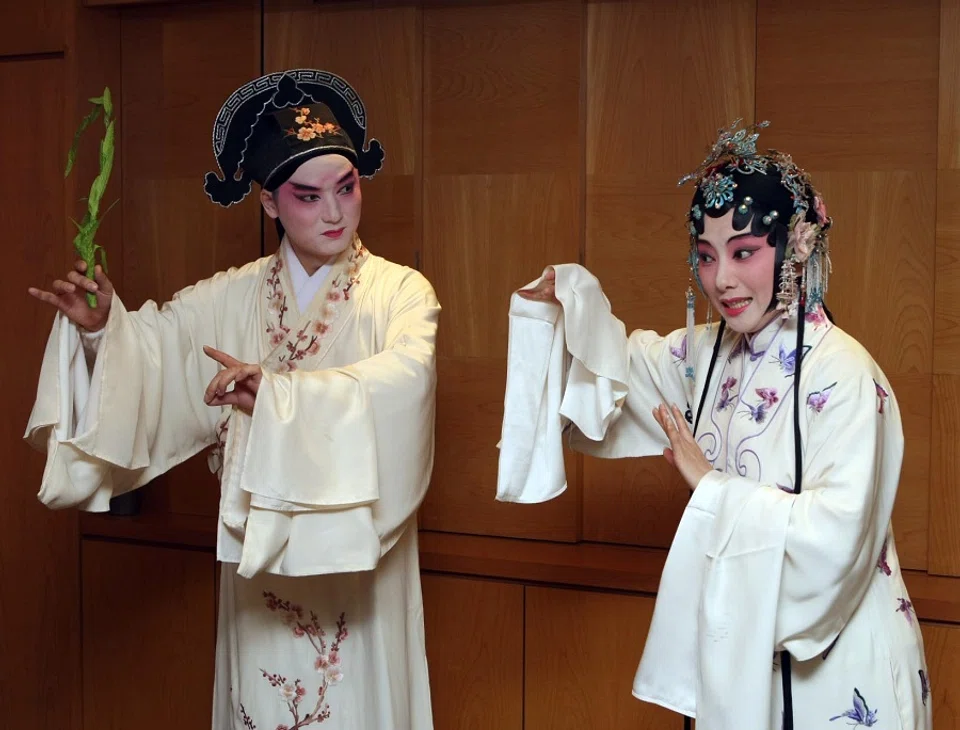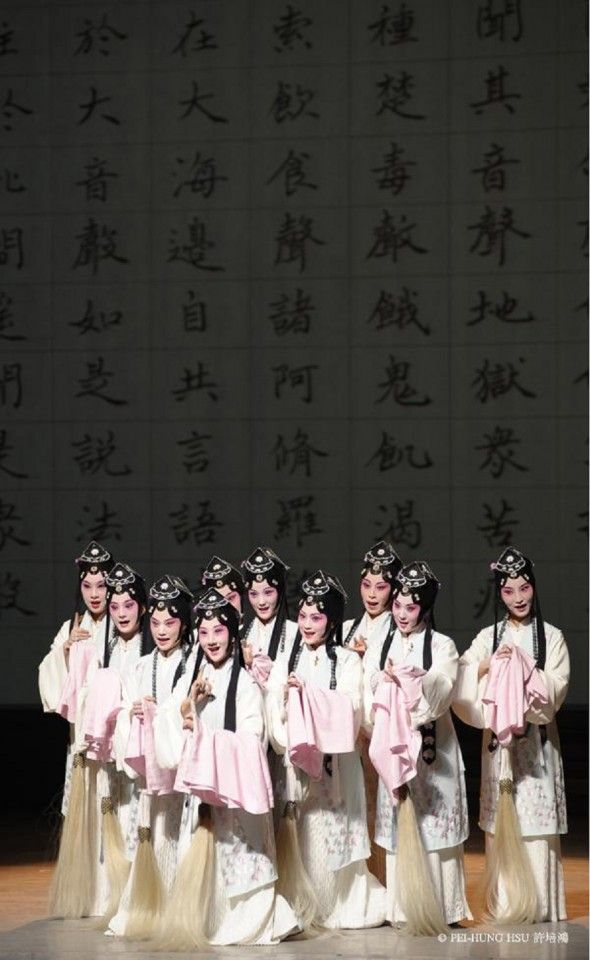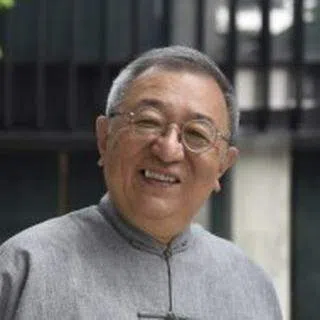Professor Littlewood and his love for Chinese opera
Cheng Pei-kai's heart is gladdened when he witnesses his British friend's pure fascination with Kunqu, the art of Chinese opera.

Xiao mutou (小木头, lit. "little wood") is the nickname that we gave him - his real name and title, is Professor William Littlewood. Nearly 70, Prof Littlewood was born in the UK and graduated from the University of Cambridge. A Hong Kong resident for nearly half his life, he has a commanding influence on English language education, with multiple books on the subject to his name. Although we knew each other in the past - we're both university professors and had some interaction in academia - we were mere acquaintances. We unexpectedly became good friends later, but not because of academic exchanges on English language education, or an interest in comparative literature - our special affinity lies in our absolute obsession with watching Chinese opera.
They would happily stroll into the venue with a beaming smile, like little children who've just received the toy they've always dreamed of...
Interestingly, Prof Littlewood and his wife are both British natives who have spent their lifetimes teaching English in universities. They do not understand Chinese, but are extremely fond of Kunqu (昆曲, Kun opera). They particularly admire the elegance and sophisticated expressions of the guimen dan (闺门旦, a character in opera, refers to a young, unmarried lady). Their top two favourite scenes are "Jolted from a Dream" (《游园惊梦》) and "Searching for a Dream" (《寻梦》) from The Peony Pavilion (《牡丹亭》) - they never tire of them. As long as there is a Kunqu performance at the Hong Kong Cultural Centre or the Hong Kong City Hall, the couple will be there. They would happily stroll into the venue with a beaming smile, like little children who've just received the toy they've always dreamed of, their eyes glistening and their hearts filled with infinite joy.

To facilitate the teaching of Chinese culture and to help my students improve their understanding and appreciation of classical poems and verses, I would arrange for three Kunqu demonstrations each semester, inviting the most outstanding Kunqu troupes in China to perform a show of zhezi xi (折子戏, an excerpt of a longer script) for us, at the City University of Hong Kong's Wei Hing Theatre. As the size of the theatre is just right, the actors need not have microphones attached to them and are able to demonstrate the most original art of singing and recitatives in Kunqu, to the delight of local Kunqu enthusiasts. Each time there was a performance, I would invite Prof Littlewood and his wife to come watch it with us. Each time without fail, they would gladly accept the invitation and watch the performance from start to finish. After the performance, they would even come forward to express their heartfelt gratitude before bidding farewell, as if they have just been bestowed a knighthood by the Queen.
...he (Prof Littlewood) would ask about the English translations of the acts, take out his little notebook, and carefully record it as if he'd just received the most precious gem.
One April, the Jiangsu Kunqu Opera Theatre was going to perform a series of 12 zhezi xi over a period of three nights - of course, I had to let Prof Littlewood know! Initially, he could hardly contain his excitement. But this excitement faded when he realised that the performance time clashed with his and his wife's night classes and he could only come to watch the final performance alone. Yet, without thinking twice or asking about the scene that was going to be performed, he decided - with much regret that he couldn't attend the others - to watch the performance alone, even if it meant just watching one act.

The four zhezi xi performed that night were: "Rendezvous" (《相约》) and "A Quarrel" (《讨钗》) from Of Pins and Bangles (《钗钏记》); "Melody" (《题曲》) from Healing Envy (《疗妒羹》); and "A Date" (《游殿》) from Romance of the Western Chamber (《西厢记》). Prof Littlewood sat beside me and after each act was over, he would ask about the English translations of the acts, take out his little notebook, and carefully record it as if he'd just received the most precious gem. He watched each act attentively and was immersed in every scene. At the end of every scene, he would even comment about what he had just watched; his comments were short but spot on - even better than some critics who've been doing this for half their lives. For example, he commented that Yunxiang, a servant girl in Of Pins and Bangles, was pretty and cute and that "Melody" was sung gently with a harmonious blend of high and low notes. He also commented that the monk Facong in "A Date" was agile in his movements and had a powerful voice.
When one even forgets to forget - that is when one truly enters a state of hua (化).
At the end of the night, he didn't leave after the performance but followed closely behind a group of fans to score a photograph with the actors. Finding this silver-haired Caucasian amusing, everyone pushed him on stage to stand side by side with the actors who still had their makeup on. The clicking away of the cameras was evidence of the international appeal of Kunqu. A saying in opera goes, "The actors are a bunch of maniacs but the audience watching are fools." Prof Littlewood was having a whale of a time on stage, but he was not a fool for sure, although he was indeed enjoying himself and grinning like a fool. He can truly be called a die-hard fan of Kunqu.

Liang Shuming (梁漱溟, philosopher and one of the leaders of the Rural Reconstruction Movement in the 1930s) once gave a commentary of the saying:
Although I'm not an opera actor, I believe that if I don't act like a maniac when I'm performing, I probably wouldn't have done a good job. If the audience weren't fools, they wouldn't enjoy the performance very much either. The biggest characteristic of opera is this: it energises and encourages the people who watch it, allowing them to empty their minds and not be bothered by the forced smiles of others. Intentionally forgetting is not enough. When one even forgets to forget - that is when one truly enters a state of hua (化) (transcendence, enlightenment).
What is hua? Hua refers to the unity of life and universe as one. This is truly the most ideal state of life. Thus I call to mind the Chinese sages that I know - they probably lived as one with the universe, living as one with others without being at all calculative. Just like the saying goes, "The benevolent one is one with the universe and its things." Now then, the heart is just and fair, and life is spirited and content. These are the true marks of a sage.
Liang believed that both the manic actors and foolish audience have reached the state of enlightenment and can be regarded as sages who were one with the universe and all that's within it. I guess opera fans would suddenly experience an epiphany and be greatly uplifted if they heard this. But I feel that Prof Littlewood is humble and warm; he's deeply content and holds a pure love for watching Kunqu. He is truly a benevolent one.



![[Photos] Fact versus fiction: The portrayal of WWII anti-Japanese martyrs in Taiwan](https://cassette.sphdigital.com.sg/image/thinkchina/3494f8bd481870f7c65b881fd21a3fd733f573f23232376e39c532a2c7593cbc)

